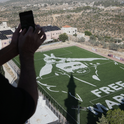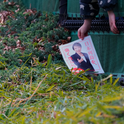Russia’s war against Ukraine is now more than 100 days old.
Putin began it with the expectation of a quick and easy victory over a corrupted, unpopular Ukrainian elite and a country with no will to defend itself. Just as his predecessor Boris Yeltsin did in Chechnya in the 1990s, he seems to have expected a “small victorious war.” But this led Putin, like Yeltsin, into a blunder of historic proportions. Instead of a near-bloodless invasion lasting three days, Putin pushed his country into a war which analysts and western governments expect to last for many months or even years.
After a sharp reduction of war aims and retreat from other areas, Russia’s focus on occupying eastern and southern Ukraine has helped it to make incremental gains. Ukraine’s President Zelensky estimates that Russia now occupies 20 per cent of Ukrainian land, including the territory it has controlled since 2014. Zelensky has also said that Ukraine may currently be losing 60-100 fighters every day.
So does this mean that, despite a disastrous start, Russia now looks likely to win the war? No. Like Ukraine, the Kremlin is continuing to lose soldiers in a war of attrition that is damaging its fighting capability. Gains continue to be slow, limited and come at a high cost. Meanwhile, Ukrainian partisan attacks take place in occupied territory and morale remains an ongoing problem for Russia’s forces. Putin may have the resources to continue the war in the medium term, but a lasting military victory seems to be as elusive as ever. A political victory has been impossible for months.
After 100 days, the war has transformed the world far beyond the battlefield, and in surprising ways.
One of these is the chasm that has opened between pre-war perceptions of Russian military might and views now. The extraordinary strategic, tactical, and operational failures of the first weeks of the war transformed the international image of the Russian armed forces from an object of awe and fear to the subject of mocking tractor-related memes. Some analysts now worry that having over-estimated the Kremlin’s military threat, western publics may now under-estimate it. What is clear is that few armies have suffered such a dramatic reputational collapse since the Second World War.
A second striking effect of the war is the radical shift in perceptions of western cohesion and purpose. A year ago, few people would have expected Germany to commit to meet Nato’s 2 per cent of GDP defence spending target, let alone its promise to send air defence systems to Ukraine. Even fewer would have anticipated bids by Sweden and Finland to join Nato, or EU sanctions against Russian banks and oil. Disappointment that sanctions have not gone further, and that German military aid has not been faster, shows how expectations have been transformed by the EU and Nato’s unprecedented resolve to punish Russia, support Ukraine and assert a shared commitment to democratic values. This cohesion has been far from perfect and is likely to be challenged in the future. That said, despite the inevitable and longstanding domestic pressures and tensions between member states, the degree of coordinated purpose has been remarkable.
Another related effect is the extraordinary speed of the shift away from Russian energy. Countries like Bulgaria and the Baltic states that were heavily dependent on Russian gas have either moved to alternative energy sources or are in the process of doing so. Not only does this have serious financial consequences for Russia, but it weakens or removes almost the only lever of influence that the Kremlin had over many European states. Russia is attempting to find new markets for its oil and gas. But these negotiations take time and the economic urgency of the task for Russia places it in a weak position.
A deeply alarming change is the rapid descent of the Russian public sphere into a discourse that looks and sounds more like fascism than a people committed to “denazifying” their neighbour. In just a few weeks, it has shifted from an already authoritarian system to one in which reporting about the war can lead to 15 years in prison, citizens can be arrested for holding blank signs, and the St George’s ribbon and letter Z (both symbols of the “special military operation”) dominate the public space. Meanwhile, Russian TV broadcasts hysterical threats to nuke Britain and sterilise dissidents.
And then there is the change in the global reputation of Ukraine and its president. Previously best known in the west for his supporting role in Trump’s second impeachment, Zelensky is now a global political icon. Ukraine, a country unfamiliar to most westerners and widely seen by western elites as corrupt and of little importance, is now acclaimed for its courage, viewed as a symbol of the fight for democracy against tyranny, and celebrated by millions of people including Scottish football fans, Eurovision voters, and Paul McCartney.
Russia’s foolish, unprovoked aggression and Ukrainians’ defence of their country are likely to continue for much longer than another hundred days. Both countries and many other people will suffer as a result—though the consequences of capitulation by Kyiv would be much worse for Ukrainian and global stability. But whatever the rest of the war brings, it seems unlikely that the seismic shifts it has caused to date will be reversed. Putin’s reckless February gamble has transformed Europe and the wider international order.













